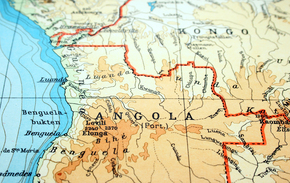 Angola in southern Africa, goes to the polls Aug. 31 to elect 220 parliamentarians and a president. The voting is expected to result in the typical farce that has marked similar elections in African countries.
Angola in southern Africa, goes to the polls Aug. 31 to elect 220 parliamentarians and a president. The voting is expected to result in the typical farce that has marked similar elections in African countries.A total 111 seats are needed for a majority. The head of the winning party automatically becomes president of the country. And that is expected to be for the 33rd consecutive year, incumbent president José Eduardo dos Santos.
In the last election 10 years ago, dos Santos's party won 191 seats or 81.54% of the vote. He and his MPLA party are expected to do the same Aug. 31.
That is a sad commentary on this land-locked and dirt poor African republic.
The United States supports the Angolan people's democratic aspirations and will accompany them through this electoral process. According to the U.S. State Department, the U.S. has provided $2 million this year to Angola to improve a civil society that is expected to train domestic observers, conduct voter education and educate African journalists in objective electoral coverage.
The U.S. Embassy in Luanda will send its diplomats to observe the electoral process in four provinces. But that move may be a little late.
There already have been reports of peaceful protests being broken up by violence and of protestors and journalists being arrested and detained. Ironically, the current Angolan Constitution calls for freedom of speech, freedom of assembly and freedom of the press.
Three main parties will contest the election. They are the ruling MPLA led by President dos Santos, UNITA led by Isaías Samakuva; and the Broad Convergence for the Salvation of Angola (CASA), a breakaway party from UNITA formed after its leader Abel Chivukuvuku lost the UNITA leadership election to Samakuva.
In June of this year, the MPLA Central Committee designated President dos Santos as head of the MPLA party list and Manuel Vicente, the Minister of State for Economic Coordination, as the second candidate on the list.
Under the Constitution, this would result in dos Santos receiving another term as President, with Vicente becoming Vice-President, in the event that the MPLA wins the election.
UNITA and other opposition parties accuse the government of giving the contract to run the elections to a Spanish company, Indra-Sistemas SA. They also ran the 2008 elections and are accused of helping MPLA win that election
Media reports note that dos Santos faces an unprecedented wave of criticism. Inspired by the pro-democracy Arab Spring movements, Angola witnessed an incipient movement of anti-government protests. In response, authorities used excessive force to crack down on the protests, most of which were organized via the internet, and curtailed media coverage of the demonstrations.
Media reports also note the atmosphere surrounding Angola's upcoming parliamentary elections is one of increasing restrictions on the rights to freedom of expression, association, and assembly and media freedom.
Nothing new there.
But the repressive climate has deepened since the resounding victory of the ruling Movement for the Liberation of Angola party in the 2008 elections. .
Angola, officially the Republic of Angola is located in southern Africa bordered by Namibia on the south, the Democratic Republic of the Congo on the north, and Zambia on the east.
Its west coast is on the Atlantic Ocean with Luanda as its capital city. The exclave province of Cabinda has borders with the Republic of the Congo and the Democratic Republic of the Congo.

 By
By 